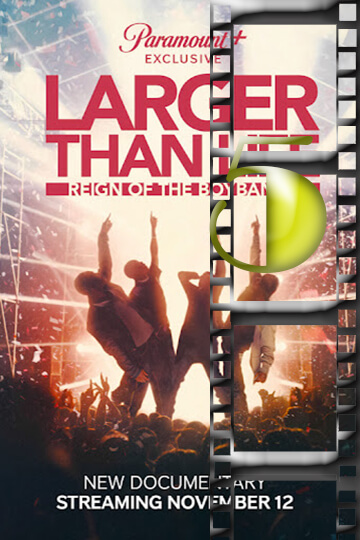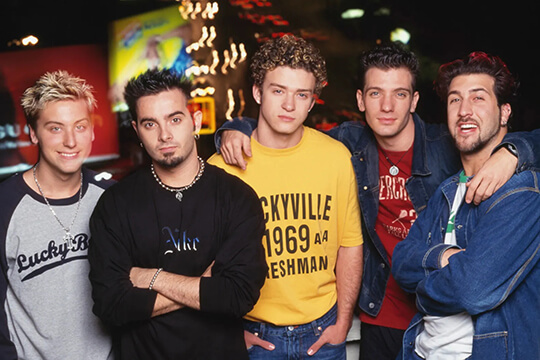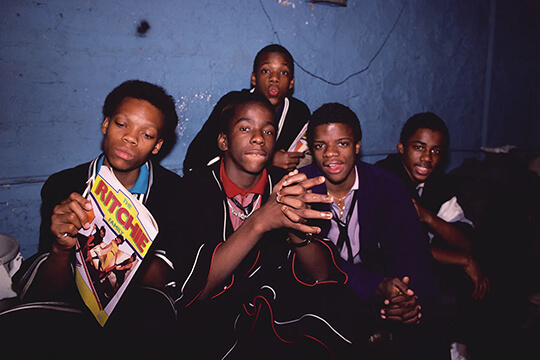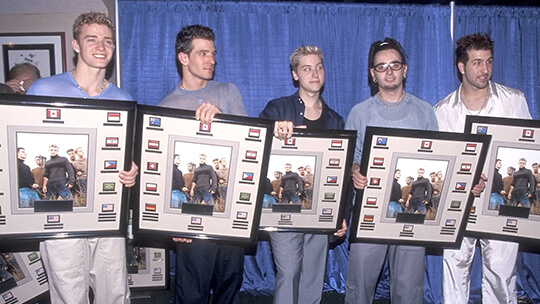

WHAT’S IT ABOUT
Chronicles the evolution, secrets, and surprising figures that helped create pop music’s misunderstood group, the boyband. NSYNC, 98 Degrees, Backstreet Boys, Hanson, New Edition, New Kids On The Block, The Osmonds, and Seventeen are featured.



MOVIESinMO REVIEW
“Larger Than Life: Reign of the Boybands” bursts onto screens with the frenetic energy of a stadium concert, attempting an ambitious chronicle of the boy band phenomenon from the Beatles’ revolutionary emergence to the global dominance of K-pop sensation Seventeen. This Paramount+ documentary pulses with nostalgic performances, backstage drama, and the deafening roar of devoted fans, but the pace ultimately undermines its potential for deeper cultural analysis. At its heart, the film assembles an impressive chorus of voices from across generations of male pop groups. Intimate interviews feature NSYNC’s Lance Bass, Backstreet Boys’ AJ McLean, and New Kids on the Block’s Donnie Wahlberg, among others, who candidly discuss the carefully crafted personas thrust upon them. These artificial archetypes – the sensitive songwriter, the charismatic rebel, the shy romantic – became self-fulfilling prophecies, as Bass poignantly reveals: “You read it so many times that then you started falling into that trope.” The documentary excels when it allows these performers to strip away their manufactured images and speak honestly about their experiences. They talk about things we already knew. The bitter label disputes, the emotional toll of sudden fame, the complex dynamics of pursuing solo careers, and the profound impact of a predominantly female fanbase often dismissed by critics. New Edition’s Michael Bivins thoughtfully traces the lineage back to the Beatles, noting how each subsequent group built upon this foundation while developing their own distinctive style through choreography, harmonies, and visual presentation. However, the documentary’s kaleidoscopic approach becomes its greatest weakness. Like a greatest hits album without the greatest hits, it flirts between fascinating storylines without allowing any to fully explain itself. There’s a little bit of Nick Jonas’s religious roots, Harry Styles’s successful reinvention, Lance Bass’s journey to self-acceptance, and AJ McLean’s battles with addiction feel frustratingly incomplete. The personal stories feel like pieces of episodes that could have told the complete story, including themes about fame, identity, and cultural transformation. What we get instead is a rush to cover every major moment in boy band history. The film’s most vital contribution is its determination to expose the industry’s exploitative underbelly, Lou Pearlman’s empire. The controversial mogul’s Trans Continental company operated as a carefully orchestrated scheme that left talented young performers physically exhausted and financially broke. AJ McLean’s revelation of “nine years straight” of relentless touring and Lance Bass’s disclosure of working “for free” under contracts that granted Pearlman 85% of earnings – plus his audacious claim to a “sixth member” share – expose the dark machinery behind the polished performances. The documentary also effectively explores the manufactured rivalry between Backstreet Boys and NSYNC, revealing how a single rejected Disney special became the catalyst for years of orchestrated competition. Chris Kirkpatrick’s observation that “the bigger the rivalry got, the bigger each band got” underscores how even apparent conflicts served the industry’s commercial interests. Most significantly, the film offers a long-overdue defense of the devoted female fans who powered the entire phenomenon. From the Beatles to BTS, these passionate supporters have been routinely mocked and marginalized. Michael Bivins rightfully identifies them as “the most successful piece in the common thread,” while Donnie Wahlberg challenges the sexist dismissal of their taste and judgment. The documentary’s most powerful insight may be recognizing that these once-ridiculed “fangirls” have grown into influential professionals who now share their musical passion with a new generation, proving that the cultural impact of boy bands extends far beyond synchronized dance moves and perfect harmonies.
OUR RATING – A FANATIC 5

